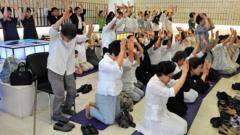The Unification Church, often referred to as the "Moonies", has been operating in Japan since the 1960s, but it has faced growing scrutiny in recent years, especially following the shocking assassination of former Prime Minister Shinzo Abe in 2022. Now, a Tokyo district court has ruled that the church must dissolve, following an investigation that revealed disturbing practices within the organization.
Abe’s alleged assassin cited the church’s financial dealings as a motive for the attack, expressing that he blamed it for his family's bankruptcy. As part of its investigation, Japan's education and culture ministry accused the church of manipulating followers into making excessive monetary sacrifices under the pretense of spiritual well-being.
The Unification Church argued that these donations were simply part of their religious practices and announced plans to appeal the ruling. Despite the court's decision to disband the organization, it will still be allowed to operate while losing its tax-exempt status and required to liquidate its assets.
Reports indicate that investigators talked to nearly 200 individuals who claimed they had been victimized by the church's coercive tactics. The church has been notorious for its controversial teachings, which include the belief that marriage is integral to spiritual salvation, notably demonstrated through mass wedding ceremonies.
Since the assassination, around 200 former members have come forward, demanding a total of 5.7 billion yen (approximately $38.5 million) in compensation, claiming they were pressured into making undue donations. Further investigations following Abe’s death revealed an alarming number of connections between church members and lawmakers from the ruling Liberal Democratic Party (LDP), causing significant political fallout, including the resignation of four government ministers.
The investigations uncovered that 179 of the 379 LDP lawmakers had varying levels of involvement with the controversial church, ranging from participating in events to providing campaign financial support, prompting national outrage over the linked relationships.
The fallout from Abe’s assassination has refocused attention on the Unification Church, catalyzing discussions on religious influence and political accountability in Japan, raising questions about the impact of such organizations on society.
Abe’s alleged assassin cited the church’s financial dealings as a motive for the attack, expressing that he blamed it for his family's bankruptcy. As part of its investigation, Japan's education and culture ministry accused the church of manipulating followers into making excessive monetary sacrifices under the pretense of spiritual well-being.
The Unification Church argued that these donations were simply part of their religious practices and announced plans to appeal the ruling. Despite the court's decision to disband the organization, it will still be allowed to operate while losing its tax-exempt status and required to liquidate its assets.
Reports indicate that investigators talked to nearly 200 individuals who claimed they had been victimized by the church's coercive tactics. The church has been notorious for its controversial teachings, which include the belief that marriage is integral to spiritual salvation, notably demonstrated through mass wedding ceremonies.
Since the assassination, around 200 former members have come forward, demanding a total of 5.7 billion yen (approximately $38.5 million) in compensation, claiming they were pressured into making undue donations. Further investigations following Abe’s death revealed an alarming number of connections between church members and lawmakers from the ruling Liberal Democratic Party (LDP), causing significant political fallout, including the resignation of four government ministers.
The investigations uncovered that 179 of the 379 LDP lawmakers had varying levels of involvement with the controversial church, ranging from participating in events to providing campaign financial support, prompting national outrage over the linked relationships.
The fallout from Abe’s assassination has refocused attention on the Unification Church, catalyzing discussions on religious influence and political accountability in Japan, raising questions about the impact of such organizations on society.





















